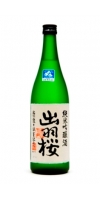Dewasansan (Sake)

Unlike wine grapes, it is not as easy to taste the difference between rice strains that are used to produce sake. There are several types of rice used to produce sake with each variety yielding a specific flavor profile. Dewasansan rice is different from its genetic parent Omachi, or the most popular sake rice, Yamada Nishiki. Dewasansan makes three junmai ginjos that are similar in style. These vary only because of the rice. Dewasansan is one of the most creative sake breweries in Japan and has been around for more than a century. Intensely floral, some Dewasansan feature aromas of pencil lead, paint and steel, and although that does not sound very appetizing, the complexity of the blend is the strength. On the palate, you will get a flowery taste at first that evolves into golden apple, graphite, yellow plum, and pear. The finish that results is creamy and smooth with a soft landing after an intensely wild ride. Dewasansan stands up to most meat dishes, especially grilled chicken and roasted pork. It is also excellent with flavorful fish like salmon and mackerel. Try Dewasansan as an alternative to choucroute or Alsatian white wine. Wine lovers will find the texture of Dewasansan similar to white wine as it retains the richness of the sake.
No products found
- back
Selected Options
Grape Types
Categories
Pricing
Countries
Regions
Grape Types
Wineries
Organic/Free Shipping
Saumaize-Michelin Pouilly-Fuisse “Clos sur la Roche” is made from 100 percent Chardonnay.
Produced from the oldest parcel of the estate dating back from 1979 and planted on the slopes of the Vergisson Rock, "Clos sur la Roche" benefits from a south sun exposure. This beautiful Chardonnay offers abundant floral and white fruit aromas, toasty and buttery notes and brioche scents. Well-balanced and concentrated on the palate with a rich structure and refreshing notes of zesty lemon and mineral purity that brings a vibrant energy to the finish.
Complex aromas of soft citrus fruits and minerals. Densely packed and fresh, with intense, complex flavors of white fruit as well as a hint of spice. The finish is very firm, long but not dry.
This site is now a Premier Cru!
The Prisoner Wine Co. Blindfold Chardonnay is made from 100 percent Chardonnay.
Blindfold Chardonnay is gorgeously balanced and a true triumph. Fragrant with notes of lime zest, yuzu, jasmine, and a slight minerality, Bright on the palate with juicy green citrus, lychee, green apple and toasted hazelnut. You’ll find both freshness and soft texture from its time in oak. The finish is long and indulgent–let yourself sink into this luxurious pour.
All of the fruit was hand-picked and whole cluster pressed. Barrel fermentation took place in 100% French oak barrels, and 23% New barrels that were selected by forest or grain tightness to frame our fruit profile, bring texture, and soften acidity. Lots were tasted every other week while we stirred the lees to precisely soften the mouthfeel and achieve optimal balance. With fermentation, and subsequent elevage taking place over 11 months we have achieved this goal.
Chardonnay grapes were harvested as flavors of lime zest and green apple started to develop and before acid started to ripen away. Picking decisions were made based on acidity rather than sugar level (Brix). We want to showcase the vineyard sites and growing region in perfect balance.




